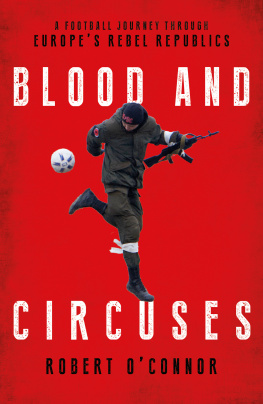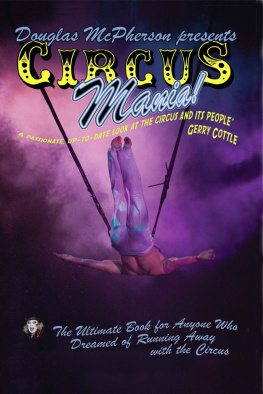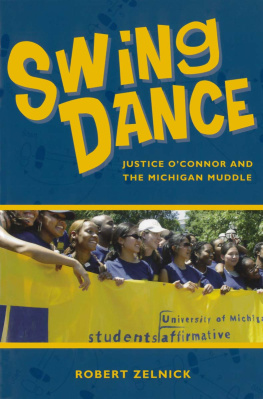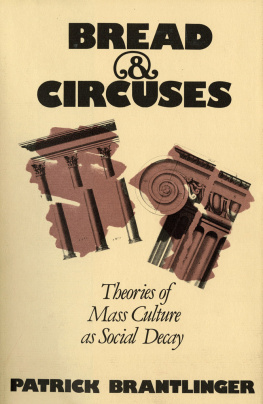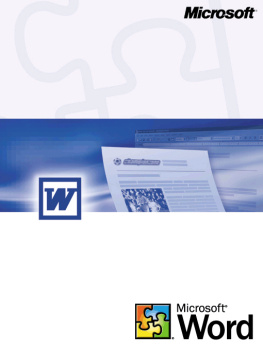Robert OConnor - Blood and circuses : a football journey through Europes rebel republics
Here you can read online Robert OConnor - Blood and circuses : a football journey through Europes rebel republics full text of the book (entire story) in english for free. Download pdf and epub, get meaning, cover and reviews about this ebook. year: 2020, genre: Detective and thriller. Description of the work, (preface) as well as reviews are available. Best literature library LitArk.com created for fans of good reading and offers a wide selection of genres:
Romance novel
Science fiction
Adventure
Detective
Science
History
Home and family
Prose
Art
Politics
Computer
Non-fiction
Religion
Business
Children
Humor
Choose a favorite category and find really read worthwhile books. Enjoy immersion in the world of imagination, feel the emotions of the characters or learn something new for yourself, make an fascinating discovery.
- Book:Blood and circuses : a football journey through Europes rebel republics
- Author:
- Genre:
- Year:2020
- Rating:4 / 5
- Favourites:Add to favourites
- Your mark:
- 80
- 1
- 2
- 3
- 4
- 5
Blood and circuses : a football journey through Europes rebel republics: summary, description and annotation
We offer to read an annotation, description, summary or preface (depends on what the author of the book "Blood and circuses : a football journey through Europes rebel republics" wrote himself). If you haven't found the necessary information about the book — write in the comments, we will try to find it.
Robert OConnor: author's other books
Who wrote Blood and circuses : a football journey through Europes rebel republics? Find out the surname, the name of the author of the book and a list of all author's works by series.
Blood and circuses : a football journey through Europes rebel republics — read online for free the complete book (whole text) full work
Below is the text of the book, divided by pages. System saving the place of the last page read, allows you to conveniently read the book "Blood and circuses : a football journey through Europes rebel republics" online for free, without having to search again every time where you left off. Put a bookmark, and you can go to the page where you finished reading at any time.
Font size:
Interval:
Bookmark:
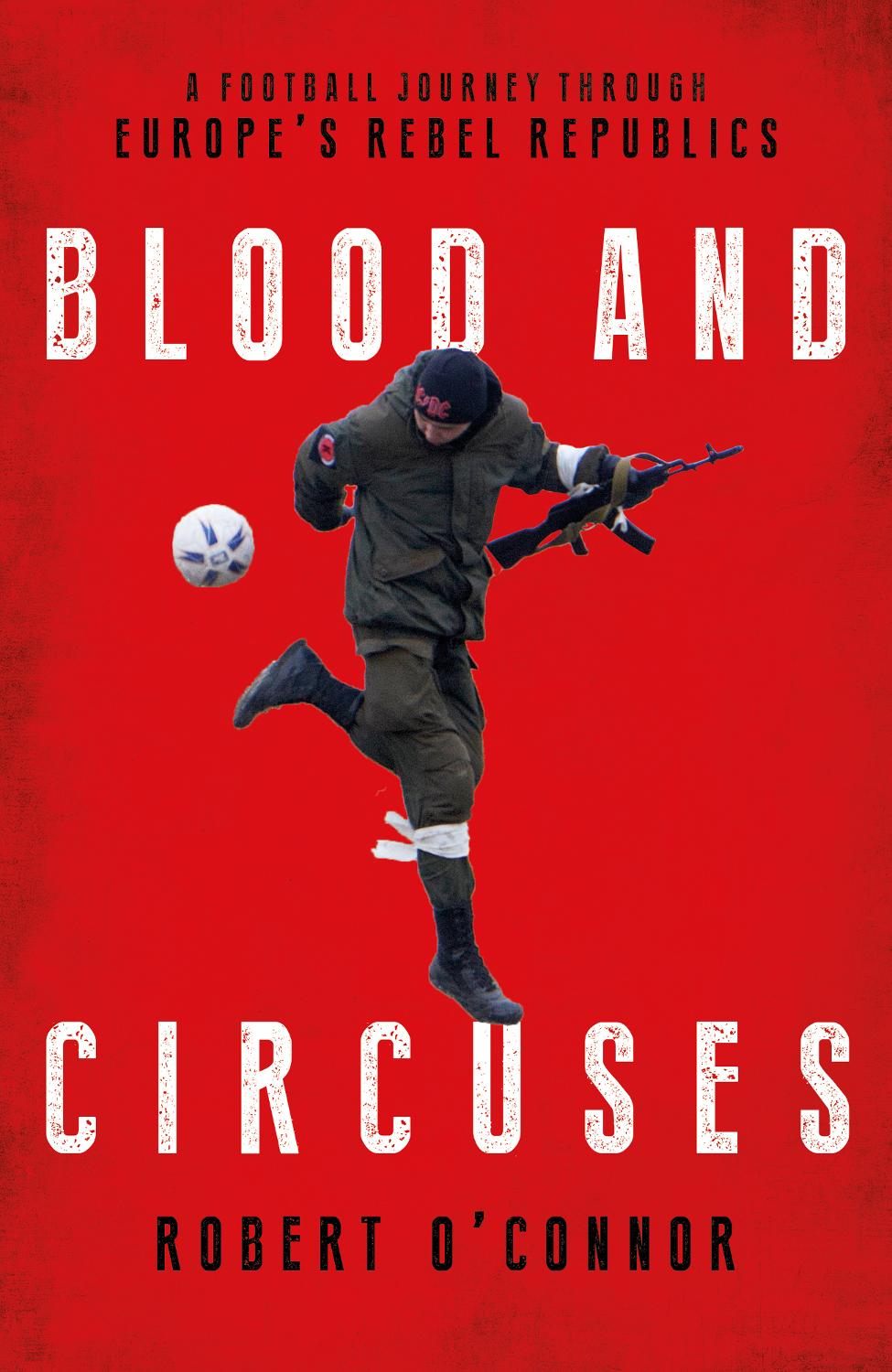
v For ASJ
D o you know whats going on over that border? asks the checkpoint guard, narrowing his eyes into an inquisitive glare. Arent you scared?
I smile a broad, forced smile, showing my teeth and leaning back slightly in my seat to create the impression of being at ease.
Nope, I reply with a nonchalant shrug that I doubt would gull the most nave inquisitor. The guard fixes me with a look that is almost sympathetic, and as he slips a cigarette neatly between his narrow lips, his dark, silent eyes seem to sneer, Yeah, right.
The truth is I am scared. But not for the reason the guard thinks. Its true that the city for which I am headed, Donetsk in far-eastern industrial Ukraine, was until recently under siege, bombarded by daily airstrikes and artillery fire from enemies staked out a couple of kilometres away in the sprawling countryside.
Today, those hardy, damned souls still fighting in the Donbass War suffer weekly casualties amongst their number, the victims of pot-shots fired by soldiers under the command of the Ukrainian capital, Kyiv.
The war in Donbass is still hot, active, alive. But its not bullets or bombs that frighten me.
Its him and his colleagues that Im scared of. The guard I have no clue as to his role here at the camp, since the place is crawling x with officials all in different uniforms looks to have been brought to life from the pages of a picture book on Soviet-era enforcers.
His black, close-cropped haircut exaggerates the angular contours and high, handsome cheekbones of his face, and his deep, sunken eyes greedily swallow the space around them like black holes. Whatever mess Ive walked myself into here on the fringes of Ukraines Donbass, neither he nor his colleagues are going to offer me any sympathy.
One hour ago, I was hauled off the bus I had boarded early this morning in the nearby Russian city of Rostov-on-Don and told I was being denied further passage by the camp authorities, who are the ordained guardians of the self-proclaimed Donetskaya Narodnaya Respublika the Donetsk Peoples Republic (DPR).
Instead, I was sent back to the customs house on the Russian side of the crossing, but as I wandered lost and bewildered around the camp, I was herded into line to cross back over the border by two dead-eyed officials who flatly ignored my protestations that I was attempting to cross the other way. Welcome to Russia, they kept repeating as I tried to get my words in order in pidgin Russian. Welcome to Russia. Welcome to Russia. Welcome to Russia. This is serious, because passing back over the border will be a one-way ticket. There will be no hope of reaching Donetsk from there. It will also leave me stranded in the Russian outback, a hundred miles from nowhere with the sky darkening and a biblical storm collecting in dirty black clouds overhead.
I still dont know how I negotiated my way out of the line back towards Rostov-on-Don. Its possible that my mind responded to the stress and the chest pains that were soaring through my lungs by simply scrubbing the memory out.
All I know is that, sat here in the dilapidated customs house in the nowhere land between Russia and the DPR, my options are limited.
I am trapped in the dead zone between a super-state and an unrecognised military-ruled pariah republic, unable to move in either direction, xi a diplomatic pawn that nobody seems to know quite what to do with. Here, my documents are not recognised, which renders me technically stateless. Legally, I am a non-entity. Its checkmate. I no longer exist.
I have plenty of time to reflect, whilst sitting in this crumbling room. My overwhelming feeling is that this has been coming to me for a long time.
Ive spent the past three and a half years negotiating some of the worlds most hostile international borders, entering territories that are not recognised under international law and that live in a constant state of conflict with the outside world.
Ive met paranoid border guards who regarded me with the deepest suspicion, merely for attempting to cross into their land, and who have treated my presence as an excuse to exercise a petty macho nationalism that ordinarily remains frustratingly dormant. In truth, I asked for my current predicament.
This isnt the usual fare of a jobbing football journalist. The ebb and flow of life as a sports writer never managed to quieten my curiosity to discover a different kind of football. Eastern Europe was always an interest, I think because of the chaos of the regions attempts to integrate with the free world during my lifetime. The building blocks of the worlds favourite game in the land of Communism are so utterly different from those that created the Hollywood football culture of Western Europe as to require a completely new vocabulary in order to understand them.
During these years I have watched football in some of Europes most obscure outposts cities, towns and villages with sad, troubled histories where the game has served as both a tonic and a lightning rod in the bloody process of post-Communist state-building. Sport and politics are familiar bedfellows here.
I suppose I feel mournful for the heyday of Soviet and Yugoslav football that I missed out on experiencing. During the days of the Communist one-party state, the game was in most technical respects just xii one more state asset, controlled and manipulated by party apparatchiks who bent the rules or simply invented new ones in nakedly self-serving attempts to get ahead. A tiny closed-off elite controlled the football giants of Yugoslavia and the USSR, which meant that the best players were simply plucked from lesser sides by order of the Communist Party and inserted into the starting XI for Spartak Moscow, Dynamo Kyiv, Red Star Belgrade and a tiny handful of choice clubs that were run by the most powerful government ministries in the capital cities of Russia, Ukraine and Serbia. Match-fixing was a fact of life, as was the influence of the shadow economy, the illegal funnelling into clubs of private wealth creamed off by enterprising crooks from the rigid but grossly ineffective command economy.
But the system also created wonderful, eternal rivalries: Red Star Belgrade v. Dinamo Zagreb; Dynamo Kyiv v. Spartak Moscow; Ararat Yerevan v. Nefti Baku. These teams rarely meet in competition football now, and when they are thrown together by the serendipity of a European draw the diminished status and financial power of the former Eastern Bloc leagues means that the games have little more footballing significance than simple nostalgia for those who are lucky enough to remember. But these matches had a national as well as a football significance.
When Dinamo played Red Star in Zagreb in May 1990, it caused a riot between Croat and Serb supporters that many believe was one of the key events in escalating what became the Croatian War of Independence. And as Thomas de Waal writes in his work The Caucasus: An Introduction, people knew to stay off the streets of Yerevan and Baku whenever Ararat played Nefti.
Football also had implications for the Yugoslav and Soviet treatment of nationality. Both states operated on a system of ethno-federalism, the dividing up of their vast territories into semi-autonomous political units that reflected the ethnic realities of those regions, where the titular nations were given special privileges. Yugoslavia divided xiii itself into six federal republics, the USSR into fifteen. Even though, in reality, the local governments in the republics did not have autonomy particularly so in the case of the Soviet Union the arrangement created two key sets of circumstances that would prove to be crucial in the way both sets of countries eventually broke up and have continued to develop into the twenty-first century.
Font size:
Interval:
Bookmark:
Similar books «Blood and circuses : a football journey through Europes rebel republics»
Look at similar books to Blood and circuses : a football journey through Europes rebel republics. We have selected literature similar in name and meaning in the hope of providing readers with more options to find new, interesting, not yet read works.
Discussion, reviews of the book Blood and circuses : a football journey through Europes rebel republics and just readers' own opinions. Leave your comments, write what you think about the work, its meaning or the main characters. Specify what exactly you liked and what you didn't like, and why you think so.

